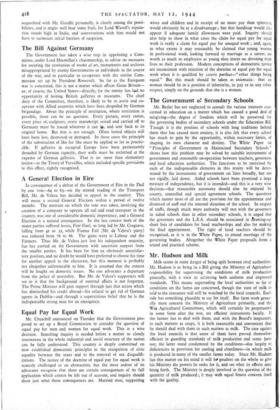The Government of Secondary Schools
Mr. Butler has not neglected to consult the various interests con- cerned in' education on a matter which has caused a good deal of misgiving—the degree of freedom which will be preserved for the governing bodies of secondary schools under the Education Bill. Though it is the position of schools with long traditions behind them that has caused most anxiety, it is also felt that every school has much to gain by the opportunity, within necessary limits, of shaping its own character and destiny. The White Paper on " Principles of Government in Maintained Secondary Schools " shows how this problem may be solved by suitable instruments of government and reasonable co-operation between teachers, governors and local education authorities. The functions to be exercised by each of the indispensable elements in this trinity will be deter- mined by the instruments of government on 'lines broadly, but not too rigidly, laid down. Aided schools have been promised a large measure of independence, but it is intended—and this is a very wise decision—that reasonable autonomy should also be enjoyed by . county, controlled and special agreement schools. The questions which matter most of all are the provision for the appointment and dismissal of staff and the internal direction of the school. In respect of staffs, though much more authority will rest with the governors in aided schools than in other secondary schools, it is urged that the governors and the L.E.A. should be associated in &awing-up short lists of candidates for head teacherships and also for making the final appointment. The right of head teachers should be recognised, as it is in the White Paper, to attend meetings of the governing bodies. Altogether the White Paper proposals form a sound and practical scheme.


























 Previous page
Previous page